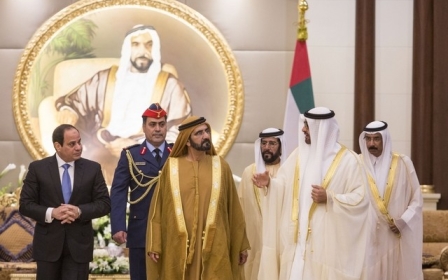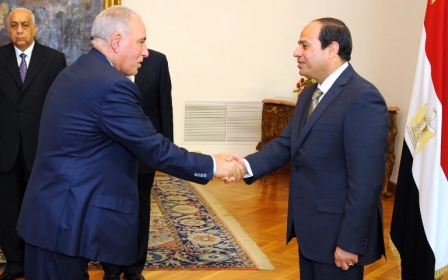Egyptian religious leader to stand trial for promoting Shia Islam

Cairo - An Egyptian Shiite leader will soon stand trial over charges of attempting to spread Shia Islam in Egypt, as members of the minority community claim that discrimination against them is increasing.
On 18 May, state security police stormed the flat of Al-Taher Al-Hashimy in Cairo, arresting him and confiscating books that allegedly aim to promote Shia Islam in the Sunni-dominated country.
The prosecutor accused him of running a covert organisation, printing books about Shia Islam without authorisation, violating the principles of the Sunni Al-Azhar religious institution and breaching intellectual property law. He was also accused of performing covert activities aimed at treatening social peace and national security.
Al-Hashimy told Middle East Eye that during interrogation he denied the charges against him. He was released on Wednesday and ordered by prosecutors to pay a bail of 1000 Egyptian pounds ($131), pending trial. The date of the trial has not yet been scheduled.
“The situation I have faced shows the kind of maltreatment Egyptian Shia suffer from,” said Al-Hashimy.
Al-Hashimy is a member in the World Assembly of Al-Beit (the family of Prophet Muhammad), an international Shia organisation.
He is known for being outspoken and has criticised the Saudi-led Decisive Storm operation against Shiite Houthi rebels in Yemen.
He has frequently called for the right of Shiite Egyptians to practice their creed freely and publicly.
Egyptian Salafists have accused al-Hashimy of having ties with Iran's Revolutionary Guards, allegations he has denied.
Double discrimination
The community leader said that Shia Muslims face discrimination by authorities in Egypt, but also from ultra-conservative members of the Sunni community.
“Salafists have been fiercely criticising Shia and their beliefs in public and in media outlets, vowing to combat them by all possible means,” Al-Hashimy said.
“Extremist Salafists have been targeting us, cooperating with the authorities as well as inciting the public against us by all means… and they have frequently announced that in public,” he added.
Local news reports said that Walid Ismail, a Sunni Salafi leader and a member in an anti-Shiite association that works on countering the spread of Shia Islam in Egypt, was behind the detention of Al-Hashimy.
Al-Bawaba News, an independent online newspaper, quoted Ismail as saying that he and other fellow Salafists were recently communicating with the authorities to help them detain Al-Hashimy for spreading Shia Islam in Egypt.
Next month, a criminal court will issue a verdict against 31 Salafists accused of killing four Shia Muslims, including top Sheikh Hassan Shehata, in attack from 2013 in Giza province.
The arrest of Al-Hashimy is the latest in a string of incidents that have seen Shia Muslims seemingly targeted for their beliefs.
There are no accurate statistics as to the number of Shia Muslims in Egypt, however, some unofficial reports have claimed they constitute around one percent of the population.
Shia convert jailed
Earlier in May a physician was sentenced to six months in prison for adopting Shia Islam, human rights groups reported. He was found guilty of blasphemy and threatening national security.
In April, a nursery in Sharkia province was shut down by the Ministry of Social Solidarity for allegedly attempting to teach preschoolers Shia beliefs and practices, news reports said.
Videos were posted on YouTube of the nursery children slapping their faces, which reports said represented a Shia practice associated with commemoration of the martyrdom of Imam Al-Hussein (the grandson of Prophet Mohamed and a figure revered by Shia Muslims).
Lawyers made allegations to Middle East Eye that despite there being no legislation banning Shia Islam, the authorities and judiciary have used existing laws related to blasphemy and community harmony when dealing with cases relating to Egypt's Shia community.
“Neither does the law or the constitution include any article that has to do with promoting Shia ideologies,” said Youssef Kandil, a lawyer representing Al-Hashimy.
“The constitution states that Islam is the official religion of the state and since Shiism is an Islamic sect; in turn, it is not prohibited legally,” he added.
Shia leaders and human rights groups claim that Egyptian Shiites are banned by the authorities from practising their rituals freely and publically. They allege that they are not allowed to build mosques of their own or Husseinya (a hall allocated for commemorating the martyrdom of Imam Al-Hussein).
Shia Muslims believe that in the seventh century Imam Ali Ibn Abi Taleb had the right to succeed Prophet Muhammad in leading the Islamic world rather than his companion Abu Bakr Al-Sedik, a belief that constitutes a major dispute between the Sunni and Shia sects of Islam.
Middle East Eye propose une couverture et une analyse indépendantes et incomparables du Moyen-Orient, de l’Afrique du Nord et d’autres régions du monde. Pour en savoir plus sur la reprise de ce contenu et les frais qui s’appliquent, veuillez remplir ce formulaire [en anglais]. Pour en savoir plus sur MEE, cliquez ici [en anglais].




